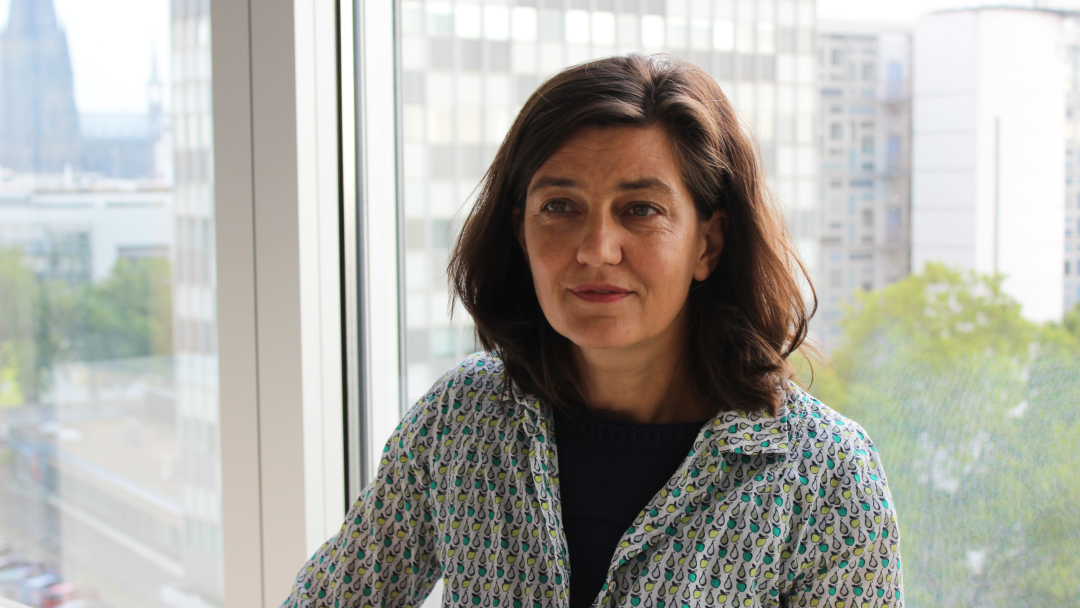News from 2015-09-08 / DEG
Spotlight on DEG's Head of Corporate Strategy and Development Policy department
Christiane Rudolph
DEG's mission is to promote development in developing and emerging-market countries by providing finance and support for private-sector investments. What are the effects DEG achieves with its commitments?
The transactions in 49 countries financed by DEG in 2014 and totalling EUR 1.47 billion will achieve a great deal in the coming years ‒ we expect 33,000 new jobs to be created and 5.5 million people to be supplied with green electricity. These are just a few of the effects generated by our new business in 2014. The current GPR report "Adding value through effective investments" provides an overview of the development effects of DEG's business.
How do you calculate these figures?
Starting in the due diligence phase DEG verifies how an investment can make a contribution to development, and after disbursement, checks which development effects have been achieved. To this end, DEG has been using its own corporate policy project rating ("Geschäftspolitische Projektrating, GPR") since 2002. The GPR measures the anticipated or realised development effects for every DEG customer, which can then be aggregated for the portfolio as a whole. Our GPR expertise has also been integrated into the data of 25 international development financiers, in an initiative aimed at furthering and harmonising development indicators.
The GPR monitoring is also supplemented by, mainly externally supported, evaluations on the portfolio level, as well as topical-based ones, for checking the plausibility of selected impacts. The results produce recommendations for action for DEG i.e. for working together and for our strategic orientation, and provide momentum for further improving our development quality.
DEG's approach leans on the input-output-outcome-impact-method, in order to assess the impacts of the investments it finances. It asks the question what output such as production capacity and quality is achieved, and what are the outcomes it gives rise to ‒ including jobs, tax payments and the supply of energy. Impacts on society are deduced from this, for example poverty reduction, improved health and education, contributions to environmental and climate protection.
What topic is DEG currently working on?
Currently we are looking at the questions: What are the hallmarks of sustainable corporate success? And what role does DEG play in this? The international consultant Steward Redqueen used portfolio analysis, interviews with DEG and its customers and three case studies in Namibia, Brazil and Vietnam to develop a model that links economic success with responsibility and anchors DEG's role in it. The results show that DEG makes a key contribution to the financial stability of companies, and that DEG's commitment makes it easier for them to get other financiers on board. They also clearly show the contributions DEG makes to a higher awareness of environmental and social issues and an improved environmental and social performance. The study provides impetus for further developing DEG's business and measuring our development effects.
The United Nations are to adopt Sustainable Development Goals (SDGs) at the end of September 2015. What role will the SDGs play for DEG?
As part of the new sustainability agenda the private sector will become an indispensable part of the so-called global partnership. It is primarily companies that create jobs, generate tax payments and provide solutions and increases in efficiency with their products.
The SDGs affirm and strengthen the approach we take in our business, which focuses particularly on the SDG "productive employment and economic growth". A challenge for us, and for the companies we finance, will be to again recognise the complexity of global development problems and offer private-sector solutions.
The private sector's potential for development can already be seen by a glance at DEG's portfolio, which rose to EUR 7.8 billion in 2014. DEG's customers employ around one million people, that is almost 300,000 more staff than at the time of DEG's first financing transaction. DEG's financing currently facilitates 30 million additional mobile telephone connections. A total of 47 percent of manufacturing companies invest in local infrastructure such as schools, nurseries and roads. The utility companies directly co-financed by DEG produce an annual 8TWh of electricity from renewables and can thus supply approx. 9 million people.
Christiane Rudolph is Head of DEG's Corporate Strategy and Development Policy department. She previously worked as an environmental and social expert in DEG's Sustainability department.
Further information


Share page
To share the content of this page with your network, click on one of the icons below.
Note on data protection: When you share content, your personal data is transferred to the selected network.
Data protection
Alternatively, you can also copy the short link: https://www.deginvest.de/s/endBZF67.BJAA
Copy link Link copied